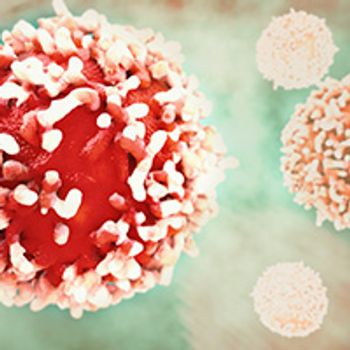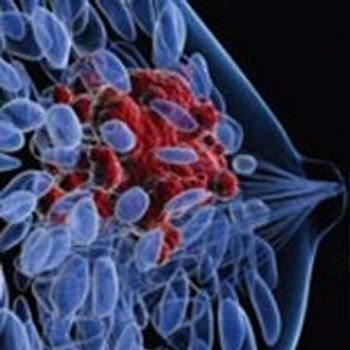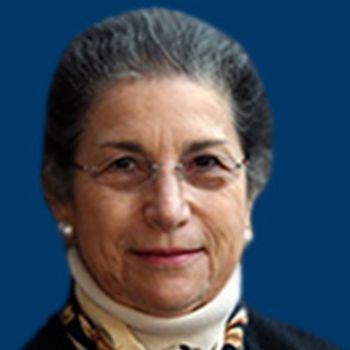
Debu Tripathy, MD, discusses updated results of the phase 3 MONALEESA-7 trial in hormone receptor–positive, HER2-negative breast cancer.

Your AI-Trained Oncology Knowledge Connection!


Debu Tripathy, MD, discusses updated results of the phase 3 MONALEESA-7 trial in hormone receptor–positive, HER2-negative breast cancer.

December 10, 2020 - The antibody-drug conjugate sacituzumab govitecan was found to induce clinical benefit over physician’s choice of therapy in patients with metastatic triple-negative breast cancer, irrespective of Trop-2 expression; however, greater efficacy was observed in those who had a medium or high Trop-2 score.

December 10, 2020 - Frontline pembrolizumab plus chemotherapy for advanced triple-negative breast cancer demonstrated efficacy across key patient subgroups, including those with PD-L1 expression by combined positive score.

December 10, 2020 — The combination of ipatasertib and paclitaxel failed to show a significant improvement in progression-free survival vs placebo plus paclitaxel in patients with PIK3CA/AKT1/PTEN-altered locally advanced, unresectable or metastatic triple-negative breast cancer.

December 10, 2020 - Favorable outcomes after treatment with the HER2-directed lapatinib were indicated by early declines in circulating tumor cell counts in patients with metastatic breast cancer who initially had HER2-negative primary tumors but positive HER2 CTCs.

December 10, 2020 - At 8 years of follow up, fewer deaths and improved cumulative incidence of central nervous system recurrences were reported with adjuvant neratinib compared with placebo in patients with early-stage HER2-positive breast cancer after trastuzumab-based therapy, according to updated results of the phase 3 ExteNET trial.

The combination of alpelisib and letrozole sustained efficacy and did not result in any new safety signals in patients with PIK3CA-mutant hormone receptor–positive, HER2-negative advanced breast cancer who received prior treatment with the combination of a CDK4/6 inhibitor and fulvestrant.

December 10, 2020 - Women who survive breast cancer may have more difficulty in becoming pregnant when compared to the general population, and have a risk of preterm labor, but most deliver healthy babies and experience no detrimental effects on their long-term survival.

December 10, 2020 - Oral paclitaxel in combination with encequidar may provide patients with radiation-associated breast angiosarcoma an effective treatment.

December 10, 2020 - Women with stage 1 to 3 breast cancer who adhered to a diabetes risk reduction diet had improved survival versus those who did not follow this specific diet.

The administration of the CDK4/6 inhibitor trilaciclib before chemotherapy comprised of gemcitabine and carboplatin resulted in a significant improvement in overall survival in previously treated patients with metastatic triple-negative breast cancer.

December 10, 2020 - Patients with early breast cancer with a HER2 single-activated pathway determined by molecular subtyping using BluePrint assay, showed a trend for greater benefit with adjuvant pertuzumab therapy, according to an exploratory analysis of the data from the APHINITY trial.

December 10, 2020 - Treatment with abemaciclib in combination with endocrine therapy significantly reduced the risk of invasive disease recurrence or death in patients with hormone receptor–positive, HER2-negative, node-positive, early breast cancer who had high Ki-67 tumors, suggesting that this feature can be used in conjunction with high-risk features to select patients for abemaciclib in the adjuvant setting.

December 10, 2020 — Oral paclitaxel and encequidar elicited lower rates of chemotherapy-induced peripheral neuropathy, as well as greater efficacy, in patients with metastatic breast cancer compared to intravenous paclitaxel.

December 10, 2020 - Mindfulness meditation and survivorship education classes reduced depressive symptoms in younger women treated for breast cancer.

December 10, 2020 - Fam-trastuzumab deruxtecan-nxki continued to showcase impressive signals of efficacy, including prolonged, durable responses and overall survival rates, as well as a tolerable safety profile in patients with HER2-positive metastatic breast cancer.

December 10, 2020 — The addition of ribociclib to endocrine therapy continued to significantly improve overall survival and delay subsequent chemotherapy compared with placebo, irrespective of endocrine partner in patients with hormone receptor–positive, HER2-negative breast cancer.

December 9, 2020 - Treatment with tamoxifen versus anastrozole did not yield any significant difference in terms of disease recurrence in postmenopausal women with locally excised ductal carcinoma in situ but understanding associated toxicities can inform care decisions.

December 9, 2020 - Whole breast irradiation, following breast-conserving surgery and adjuvant endocrine therapy, can be omitted from the treatment journey of low-risk, older patients with pT1-2 tumors (≥3 cm) who are on local control at 10 years.

Ian Kunkler, FRCP, FRCR, DMRT, MRCP, discusses the 10-year results of the PRIME 2 trial in patients with breast cancer

December 9, 2020 - The combination of oral paclitaxel and encequidar led to an estimated 26.5% reduction in the risk of death compared with intravenous paclitaxel in patients with metastatic breast cancer, according to updated phase 3 findings of the KX-ORAX-001 trial.

Kevin Kalinsky, MD, MS, discusses the initial results of the phase 3 RxPONDER trial in patients with hormone receptor–positive, HER2-negative breast cancer.

December 9, 2020 - The artificial intelligence–digital breast cancer risk discrimination platform PreciseDx was able to classify patients with Oncotype Dx low-risk recurrence scores with high accuracy using only hematoxylin and eosin stain images and limited clinical data.

December 9, 2020 - Intrinsic tumor subtype was found to be associated with prognosis in patients with hormone receptor–positive, HER2-negative advance breast cancer who received the CDK4/6 inhibitor ribociclib.

December 9, 2020 - Among women who underwent a mastectomy plus reconstructive surgery, those who received a breast cancer diagnosis, received chemotherapy and were younger were reported to have a higher risk of new chronic controlled substance use.

December 9, 2020 - Follow-up circulating tumor cell assessments were confirmed to strongly predict overall survival outcomes in patients with metastatic breast cancer, when performed at a median of 29 days following treatment initiation.

December 8, 2020 - Oncologists widely under-recognize substantial symptoms in patients with breast cancer receiving radiotherapy after undergoing a lumpectomy, highlighting a need to improve symptom detection.

The addition of chemotherapy to endocrine therapy led to an improvement in 5-year invasive disease-free survival and overall survival in premenopausal but not postmenopausal women with hormone receptor–positive, HER2-negative, lymph node–positive breast cancer and a recurrence score between 0 and 25.

December 9, 2020 - The combination of abemaciclib and standard endocrine therapy showed a 28.7% reduction in the risk of invasive disease recurrence or death compared with endocrine therapy alone in patients with high-risk, early hormone receptor–positive, HER2-negative breast cancer.

Hope S. Rugo, MD, FASCO, discusses the updated findings of the SOPHIA trial in HER2-positive metastatic breast cancer.